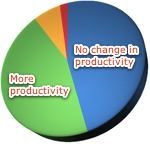On his blog Remarkable Leadership, Kevin Eikenberry cited an interesting study result in his article "Leadership and Meetings": Almost no manager expects productivity to drop if meetings got banned for one day a week. About half of them even think productivity would increase!
In the OfficeTeam survey, 150 executives were asked "How would employee productivity be affected if your company banned meetings one day a week?" The results:
- No change: 46% (blue)
- More productive: 45% (green)
- Less productive: 7% (yellow)
- Don't know: 2% (red)
My subsequent question would be: "So, why do you think those meetings don't add value, and what are you going to do about it?"
Meetings have the purpose of fostering efficient communication. But just coming together in a room to talk doesn't cut it. That's the time, money and drive sink we all dread. As always, you have to do things right to reap the benefits.
Brian lists the most important things you should take care of to stop the waste by ineffective meetings:
- Have clear desired outcomes for every meeting that are communicated before hand.
- Use, and follow an agenda (that is focused on those desired outcomes).
- Hold people accountable for the action items.
So, there are two documents that are crucial for effective meetings: an agenda, sent to everyone in advance, and the meeting minutes (complete with action items and deadlines), sent to everyone after the meeting.
And hey, if you make your meetings really effective, you can have that no-meeting day anyway!
